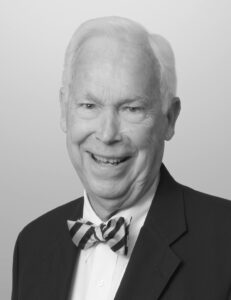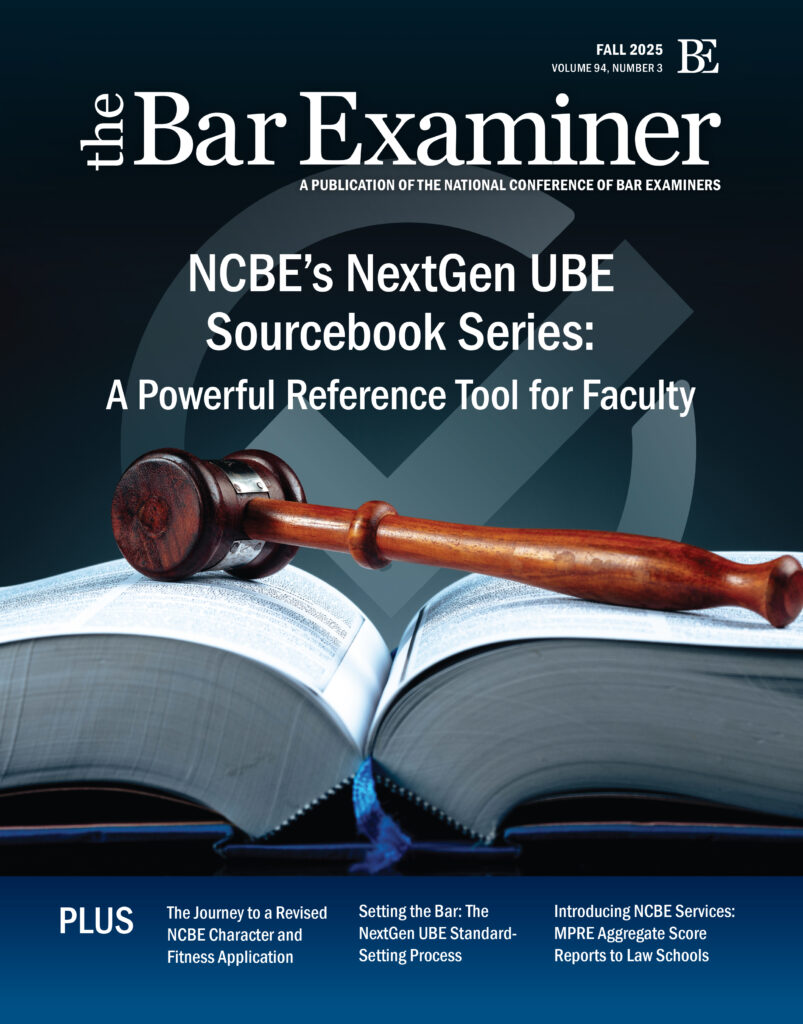This article originally appeared in The Bar Examiner print edition, September 2015 (Vol. 84, No. 3), pp 48.

John F. Germany, former chair of the NCBE Board of Trustees (1974–1976), passed away on August 26, 2015. The following is a tribute to John written by Robert L. Potts, former NCBE Board of Trustees chair and chancellor emeritus of Arkansas State University.By Robert L. PottsJohn Germany, revered former chair of the Florida Board of Bar Examiners and of the NCBE Board of Trustees, passed away at 92 on August 26, 2015, after a brief illness. His was an extraordinary life, filled with service to others and creativity in all that he did. Those of us in bar examining who were fortunate enough to have worked with him realize what an outstanding mentor he was and the significant positive impact he had on the entire bar examining process.
John grew up in Plant City, Florida. From an early age he recognized the value of hard work and high aspirations. By the time he was 12 he was delivering newspapers and picking strawberries to help support his family and to put money into his college fund. He matriculated at the University of Florida, where he graduated with honors. He then began military service during World War II, serving with distinction as a combat Army tank commander in Europe, where he helped liberate a Nazi concentration camp.
He enrolled at Harvard Law School, where he first met Joe Covington, with whom he later conceived, developed, and marketed the Multistate Bar Examination. After graduating from Harvard in 1950, he returned to Tampa to practice law and, while later serving as the Chief Legal Advisor for Legislative Affairs to Governor LeRoy Collins and working with then Legislator and later Congressman Sam Gibbons, persuaded Governor Collins not to block the efforts (vehemently opposed by the two largest state universities) to create a new state university, the University of South Florida, in Tampa. Collins, Gibbons, and Germany are considered the three “founding fathers” of USF, which now enrolls almost 50,000 students and has an annual economic impact of over $4 billion.
In 1959 he was appointed a Circuit Judge for the Thirteenth Judicial Circuit of Florida, and later became Chief Judge. He resigned to practice law again, and his original firm merged with another in 1968 to become Holland & Knight, where he was a founding partner and continued to work until he was 90 years old.
In 1967 the Florida Supreme Court appointed John to the Florida Board of Bar Examiners, and he soon became convinced that the Florida Bar Exam, consisting solely of essay questions drafted by out-of-state law professors, was of poor quality and that the grading was subjective and not uniform. The number of applicants in Florida was becoming so large that the grading process threatened to overwhelm bar examiners and delay the announcement of results unacceptably. He discovered the same problem in other states with large applicant populations.
In 1969 John was appointed to NCBE’s newly formed Bar Examination Committee, where he reconnected with his law school friend Joe Covington. Joe was made reporter of the Committee, and they, with assistance of the other members and the Educational Testing Service, began work on a groundbreaking examination with 200 multiple-choice questions covering five subjects, designed to bring uniformity and objectivity to the bar examining process—what we have all come to know as the Multistate Bar Examination.
The first MBE was administered by 11 jurisdictions in February of 1972. Joe Covington was made NCBE Director of Testing, and he and John and other members of the Committee traveled the country “selling” the test to other jurisdictions. John became chair of the MBE Committee in 1976, and eventually almost all jurisdictions adopted the exam and continue to use it today.
During his tenure as chair of the NCBE Board of Trustees from 1974 to 1976, John was instrumental in organizing and supporting bar admission administrators in a new organization known as the Committee (now Council) of Bar Admission Administrators (CBAA). This action not only captured a huge reservoir of talent and knowledge that could be used to improve the bar exam process but provided a means of uniting and fostering communication among administrators nationwide.
Among John’s greatest achievements was leading an effort to build and fund a new downtown library in his home community of Tampa, which in 1999 was named the John F. Germany Public Library. The day after his death, the University of South Florida named a park next to its library the John F. Germany Legacy Park in his memory. Over his lifetime, John received many awards, all speaking to his devotion to public service and his extraordinary ability to convince people from different backgrounds and with different opinions to work together for the common good.
Farewell, John Germany, and thanks for a life devoted to your family, colleagues, friends, and clients—a life lived in service of others. We especially thank you for all you did for NCBE and the bar examining community.
Contact us to request a pdf file of the original article as it appeared in the print edition.







